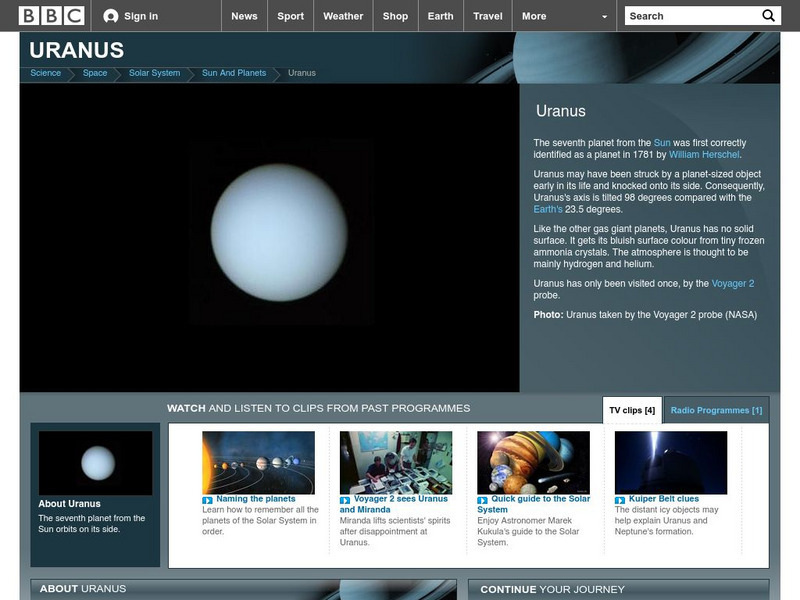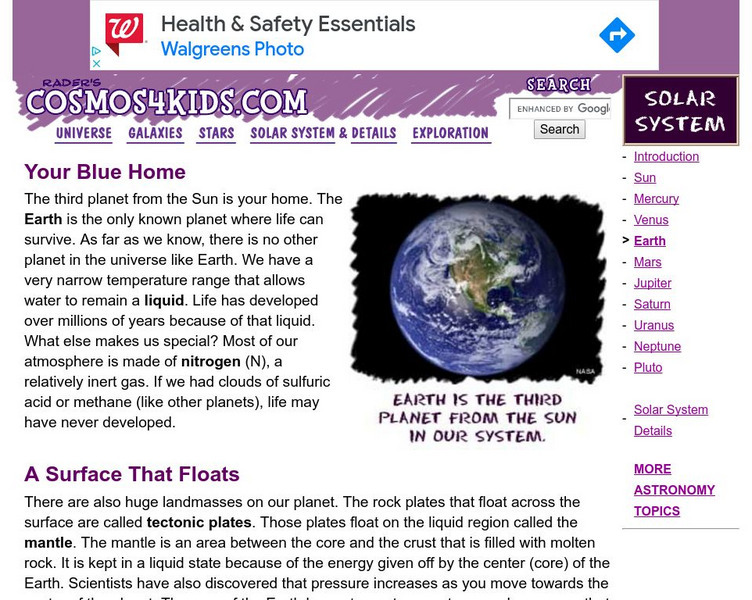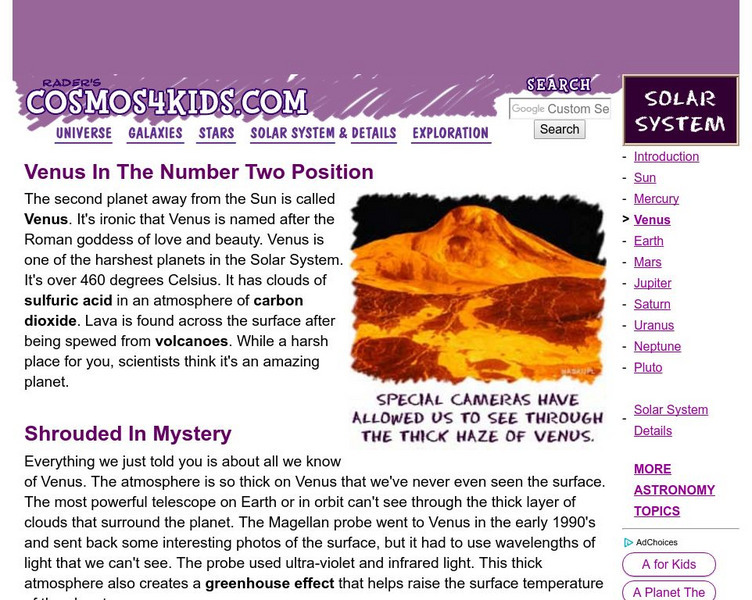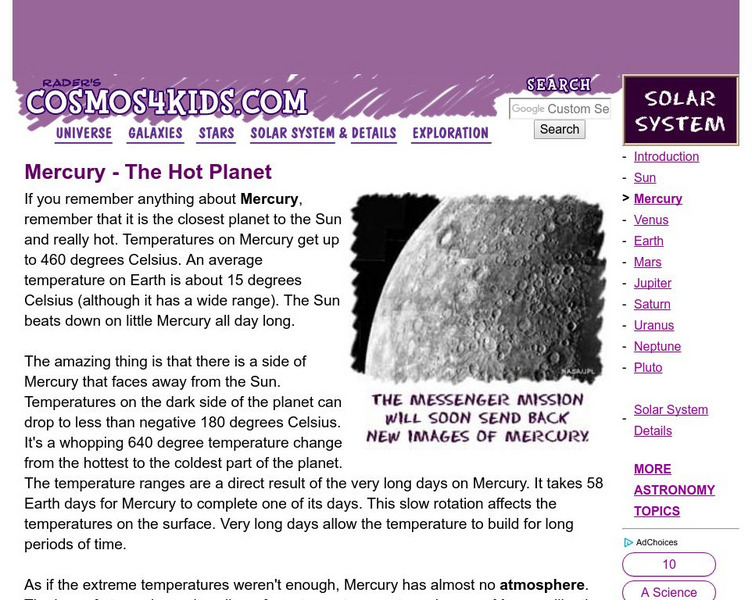Utah Education Network
Uen: The Night Sky
Learn about the rotation of the earth, the movement of the moon, and the position of the sun.
NASA
Nasa: Solar System Exploration
Enter our solar system to interact with the planets, moons, asteroids, meteors, and more. Investigate with NASA scientists and explore missions related to space exploration. Read facts, compare statistics, look through resources, and...
Other
Space Science Institute: Alien Earths: Star and Planet Formation
Learn about the lives of stars, and how stars and planets form. The Interactive activity, 'Planet Families' requires Adobe Flash and cannot be launched.
PBS
Pbs Learning Media: Meteor Showers
This video segment adapted from NASA uses animation to illustrate the properties of meteor showers and comets. Included is are visualizations of a comet's tail and of Earth passing through a debris stream left behind by meteoroids.
NASA
Nasa: Neptune: Overview: The Windiest Planet
Prepared by NASA, this site provides a detailed look at the planet Neptune. The menu tabs are divided into overview, moons, rings, photo gallery, and facts and figures. Just click to access specific information on any of these topics.
NASA
Nasa: Eyes on the Solar System
This interactive experience allows users to assume different positions and vantage points in space while moving through the Solar System. Also, explore the 2011 Juno spacecraft mission to Jupiter with real-time positioning in space.
NASA
Nasa: Eyes on the Solar System
Are you ready to ride the Curiosity to the surface of Gale crater? This 3-D environment created with NASA mission data allows students to experience space and time. With this website students can also hop on an asteroid, fly a Voyager...
BBC
Bbc: Uranus a Mission
Very good narrative about Voyager's mission past Uranus. Details the difficulties of the voyage, as well as containing very good pictures of its moons.
BBC
Bb Ci Space: Solar System
Take a journey through the solar system with this interactive guide. Includes planetary history, "travel information," "tourist highlights," and video clips. Games and quizzes include a Solar System jigsaw that prompts the student to...
NASA
Nasa: Solar System Exploration
This stunning site on the solar system gives a great overview of the planets and our sun. Learn about each object's size, vital statistics, and moons. Then go on for a more in depth look at these objects in the column on the left.
Utah Education Network
Uen: How Big Are Earth, Sun, and Moon?
Understand where the sun is in the solar system and how big the earth, moon, and sun are.
NASA
Nasa: What Is a Planet?
This lesson teaches students about the characteristics of planets, comets, asteroids, and trans-Neptunian objects. After learning about these different things, students then are to debate about a new object that is found in space.
Utah Education Network
Uen: Themepark: Home/habitat: Planet Earth
Find a large collection of internet resources organized around our home planet, Earth. Links to places to go, people to see, things to do, teacher resources, and bibliographies.
Cosmos 4 kids
Cosmos4 kids.com: Solar System Details
This comprehensive site delves into other aspects of our solar system besides the planets and the sun. Click on the topics on the right like solar winds, the heliosphere, the heliopause, asteroids, comets, and more.
Cosmos 4 kids
Cosmos4 Kids: Solar System: Neptune
Learn the basic details about the planet Neptune! The brief, to the point text makes this site most suitable for younger researchers.
Cosmos 4 kids
Cosmos4 Kids: Solar System: Uranus
Learn all the basic facts about the planet Uranus. The brief, to the point text makes this site most suitable for younger researchers.
Cosmos 4 kids
Cosmos4 Kids: Solar System: Saturn
Learn the basic facts about the planet Saturn. The brief, to the point text makes this site most suitable for younger researchers.
Cosmos 4 kids
Cosmos4 Kids: Solar System: Jupiter
Learn all the basic facts about the planet Jupiter. The brief, to the point text makes this site most suitable for younger researchers.
Cosmos 4 kids
Cosmos4 Kids: Solar System: Mars
Learn the basic facts about the planet Mars. The brief, to the point text makes this site most suitable for younger researchers.
Cosmos 4 kids
Cosmos4 Kids: Solar System: Earth
Learn the basic facts about planet Earth, and its unique position as the only known planet where life can survive. The brief, to the point text makes this site most suitable for younger researchers.
Cosmos 4 kids
Cosmos4 Kids: Solar System: Venus
Learn the basic facts about the planet Venus. The brief, to the point text makes this site most suitable for younger researchers.
Cosmos 4 kids
Cosmos4 Kids: Solar System: Mercury
Learn all the basic facts about the planet Mercury. The brief, to the point text makes this site most suitable for younger researchers.
Cosmos 4 kids
Cosmos4 Kids: Solar System Details: Asteroids
Learn about asteroids. What are they? What is their structure? Difference between asteroids and comets? The brief, to the point text makes this site most suitable for the younger researcher.















